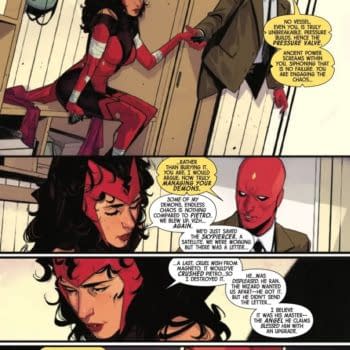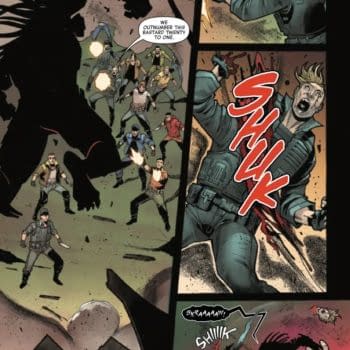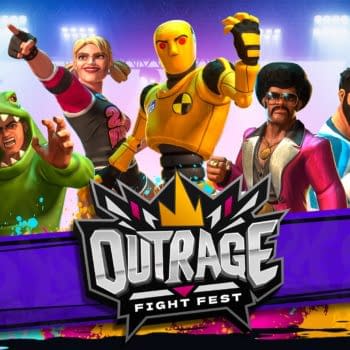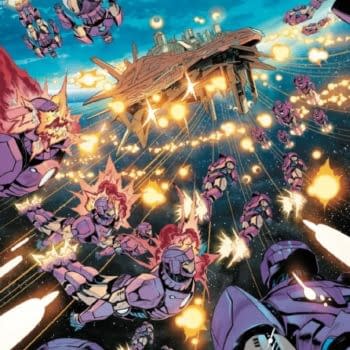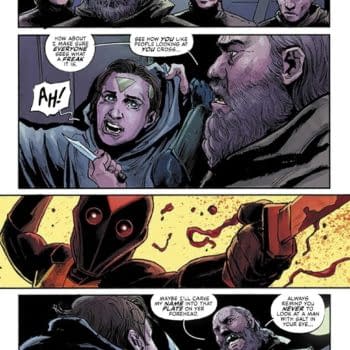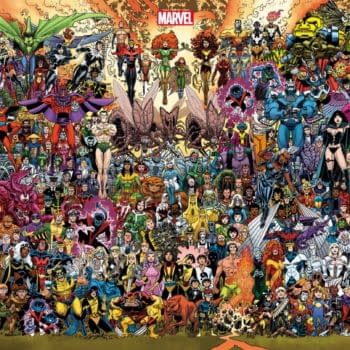Posted in: Comics | Tagged: Batman, Comics, david finch, dynamite, entertainment, HRL, steve orlando, the shadow
Writer's Commentary: Steve Orlando Talks The Shadow/Batman #1
Dynamite has sent over a writer's commentary for the first issue of The Shadow/Batman written by Steve Orlando. The issue has a variety of covers to choose from, but we've got the David Finch one here along with some interior pages from Giovanni Timpano.
PAGE 1:
New Year's Eve in New York. This is actually an allusion to the Holiday Knights episode of Batman: The Animated Series, which just came up on its 25th Anniversary the year Shadow/Batman is coming out, this year. As well, with the concept of New Year's resolutions, and Professor Pyg being obsessed with transformation, himself inspired by Pygmalion, it seemed like the perfect holiday for him to pull his latest theatrical bid for ugly perfection. Batman: The Animated Series is a strong influence on this book in general, which hopes to feel both modern in setting, but with a style that's timeless and pays love to the pulp roots of our heroes.
PAGES 2–3:
It's big, it's Batman, it's the Shadow. We need to open with a double-page splash, and Gio overdelivered here. It's his and our opening statement on Batman. And at the same time, it plays into the geography of crimefighting. In Gotham, Batman is a fixture, and everyone knows him. But seeing him in New York is more irregular. So we get confusion from the people in the crowd, amidst the chaos. They know he's not from around here, and doesn't always come to New York, so something must be pretty bad if he's shown up. There's still awe though, that is until we break it with Damian's most mundane intro line. Robin's lack of thrill at Batman continues to show the mortality of Batman, and our heroes. Even Batman is just dad to someone, even he doesn't impress everyone, especially when he steps out of his comfort zone.
And outside of Batman's comfort zone is where the Shadow exists. So we know we're in for something.
Also Gio's Dollotron in the bottom right corner is perfect.
PAGE 4:
Then we get our debut of Robin. Totally cool. A ninja kid. And totally nonplussed by superheroics. He's been raised in this. And even though he's thirteen, he thinks he's ready to be on his own. Gio does an amazing Robin, capturing his deadly acrobatics in contrast to the more brutal fists of Batman and the brazen rage of the Shadow. His Robin has been the surprise of the entire run.
PAGE 5:
I love the icy lettering on Batman here. Lettering can do so much in so little space. Instantly it's not just about Batman not being happy about Robin's snark, but we know something deeper is going on between them that this would be Batman's first reaction.
Also Porcine is a great word. Pyg's dialog, as pioneered by Grant Morrison, is such a great blend of the absurd and the psycho-sexual. It's made to unnerve.
PAGES 6-7:
Gio does great work here with Pyg, as we see his fear switch from Batman to the people he mentions at the end, the Silent Seven. And again, it heightens the stakes. What could Pyg possibly fear more than Batman?
The Silent Seven as well are a modern take on a group that once opposed the Shadow.
As well, again Gio does amazing work with Robin here. His motion through the crowd of Dollotrons is kinetic and fresh, and beautiful to follow. Damian as well references his odd childhood, raised by killers, which gives him a unique point of view on what is out of the realm of the usual. Dollotrons? That's just a Tuesday.
PAGE 8:
In BATMAN/SHADOW, Margo Lane was the Shadow's last connection to his humanity. She was the one that also saw through his nonsense, his self-delusion, and his self-loathing. She was not intimidated by anyone. But she was 107 years old. Here, the person the Shadow has never known how to express his feelings for, not truly, has been taken by the one villain no one can defeat: age. Death. Just as the Shadow thinks he's reached his lowest at the end of the last series, with the destruction of Shamba-La and his self-condemnation to a life as the Shadow. The Shadow believes he will never be released from his mission as of the end of the last book. He's doomed. But the loss of the one person he always took strength from, even if he didn't know how to say it, is maybe even more of a reality check for him.
It's filled him with an impotent rage he has no outlet for. One he didn't expect.
Also, as a detail, Blue Coal was one of the main advertisers on the Shadow radio show.
PAGE 9:
Here, Pyg muses on power and the fragility of the lies we tell ourselves about our relationships. To Pyg, he's getting great service in prison.
We have a reference to Cardona, one of the Shadow's original allies on the police. Now decades later, the Cardonas are still working in law enforcement, but who knows if they remember the Shadow? Who knows if they want to?
As well, we debut the Shadow's mental powers here. We push further into the supernatural mystery of the Shadow here. He is the master of the minds of men. Including clouding the minds of an entire police station to get to Pyg.
PAGE 10:
The Shadow debuts! His ornate, old-time way of speaking I think adds to his otherworldly mystique. The Shadow is willfully timeless, not subscribing to our conventions, and does not speak like anyone else on the planet. These are the times we can most recall the dark, flowery style of the radio show that did much to create the Shadow's voice.
Gio did a beautiful job here as well with the Shadow emerging, melting up from nothing. He does what can't be explained, and we are never allowed to understand.
PAGE 11:
Pyg's dialog here is an allusion to Harry Harlow's wire mother experiment, which Morrison notes inspired some of Pyg's character.
As well, we get a line I love from the Shadow. He is angry, literal, and unaware when he is unintentionally funny. In some ways he plays like the legend of Liam Neeson's famous lack of a sense of humor.
We instantly contrast the Shadow's brutal power compared to Batman as he begins to shatter Pyg's mask with his bare hands.
PAGE 12:
A SHOAT is a young pig, which came into my lexicon when I was doing a book that couldn't have swearing but could have ornate old-time insults. With Pyg, it's newly appropriate.
As well, this is where we get the core conceit of the book. The Shadow doesn't know. And what does he not know, the primal question? He doesn't know who he is. After Shamba-La's loss, after Margo's loss, he is searching for definition outside of a mission he hates.
PAGE 13:
Jonathan Lord is Silverblade, an old school DC character and silver screen actor I thought fit the tone of the book. As well here, we see Batman brooding over family, another core concept of this book. If the Shadow beget Batman, and Batman beget Robin, they are a crimefighting Grandfather, Father and Son.
As well, we leave this page with a Shadow balloon we didn't expect. A question we might not want an answer to. Has the Shadow been watching Bruce without him knowing it? Has he been inhabiting the mind of Alfred?
PAGE 14–15:
Gio's Batcave is a wonder to behold! Rich in old time Batmobiles and Easter Eggs. He knocked this out of the park! Batman is doing the modern version of microfiche research here, building on the idea that then and now, data is something that never goes away.
The Silent Seven as a concept was not known to him, was hidden from everyone perhaps through hypnosis. But now that he knows to look for it, now that he's aware of it, we see they've been hiding in plain sight. You can't fight, can't plan for something you can't conceive of. Batman is already playing catch-up.
In the newspaper reports, we see headlines highlighting important heroes of the public domain: the original Daredevil, the Black Terror, and Miss Fury, the first female superhero created by a female creator: Tarpe Mills. Shadow/Batman is a tribute to this entire heroic legacy.
PAGE 16:
Then we show the lineage of the Silent Seven and its former leader: James Moriarty. Batman and the Shadow are up against the people that killed the man that may have killed Sherlock Holmes. Maybe the greatest criminal mind to have ever lived.
This was the moment the Silent Seven fell off the map, the moment they ascended from being a mere criminal network to a group running every working bit of society from high above. Invisible to those down on the ground living day to day. This murder was the price they paid to ascend to their seat atop the world.
PAGE 17:
I love Damian's understatement here with his age. He is both incredibly self-aware and also completely lacking in context. Our SFX work here is the first hint that something isn't right with Batman. Batman doesn't make noise. Or scuff his feet like a shambling zombie.
PAGE 18:
Damian speaking more ornately here as he fills with attitude if our first hint that he is perhaps more like the Shadow than his father is. And it's not just the brutality and background in killing, even if he doesn't do it anymore. He gets a kick out of his wit, and is happy to play into it.
As well, if we look closely, we see Batman is wearing his NEW 52 uniform. Something is wrong with this Batman. Damian already knows it.
PAGE 19:
This Batman's dialog is just out of character, just too direct and cold. Something is not right. Batman himself is direct, but not with Damian. This Batman talks to Damian like he's just anyone else.
I also love how Gio did Damian swiveling in his chair here. Even cornered, Damian feels like he's controlling the room. And he probably is. He calmly shoots down Batman's excuses for why he's here, and each question and bad answer is telling Damian something else about this Batman.
PAGE 20:
Holt-Tech here is a reference to Michael Holt, DC's Mister Terrific, whose uniform and mask make him invisible to technology.
In Damian's line about being Alexander, we both recall one of Talia, his mother's first goals for him, as well as show his innate tendency to go against other people's goals for him. He makes his own goals and steers his own life, even if it's to his detriment, like leaving him alone to face a strange Batman.
We also return to the concept of data here. Everything is everywhere, invisible, these days. And the Silent Seven are watching even if Robin doesn't know it. They're watching everywhere at once, in all directions.
Damian's line about octopus arms is a reference to their cognition, which is pretty unique, as their arms have huge amounts of nerves an act semi-independently. They follow the general command of the head, but not the specifics of how to accomplish it. Damian theorizes this is how a network of people under hypnosis or mind control might act following the commands of their mass puppeteer.
PAGE 21:
Damian is at his most petulant here, he hates when people talk down to him. And as Damian lets himself act a bit more like a child, it only further irritates the Batman acting like his father. Because this Batman can't stand the childish act and retorts. This Batman becomes more petulant himself, finally fed up and offering only a bizarre version of "because I said so!"
But that's the last thing Damian needed. Now he knows this isn't his father in any way.
PAGE 22:
That's when in lettering Damian for the first time put quotes around the word "Dad." He knows this isn't Bruce. The charade is over.
All that's left is to take this impostor, this threat off the table. And just like in every other way, this Batman has underestimated Damian's efficiency. Perhaps Damian is more like the Shadow than we know, because this end seems pretty final for whomever is in the Bat-suit.















